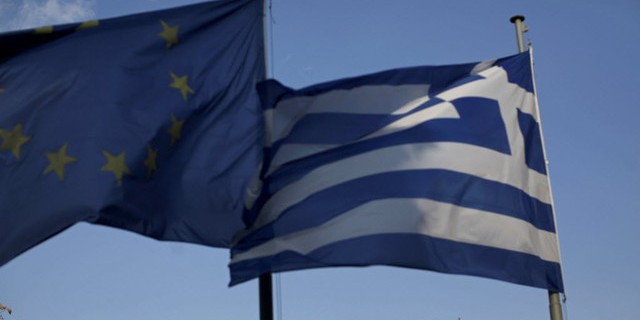Greek Signals of Compromise Send Markets Soaring

Greece’s new leaders, on a hopscotch tour of European capitals, convinced markets on Tuesday they are eager for a deal with creditors, but their still fuzzy proposals await a harder hearing from Athens’s toughest lender: the German government.
Investors staged a massive rally in Greek stocks and bonds Tuesday, pushing the main Athens index up 11%. Greek banks leapt 20%, and the yield on Greece’s 10-year bond dropped 1.5 percentage points.The action helped lift broader European markets—especially those in Spain and Italy, each of which was up more than 2.5%.
“After a first week of making very provocative demands on its creditors, it looks as though the Greek government has stepped back and that sensible discussions will now start,” Philippe Gudin and François Cabau, economists at Barclays wrote clients.
The whirlwind travel schedules of the Greek prime minister and finance minister seemed to be evidence that Greece was pleading for time to present a plan to bridge the considerable gap between their radical Syriza party’s demands for fiscal relief and a German-led desire to enforce the stringent terms of Greece’s €240 billion ($272 billion) bailout.
Meetings last week in Athens, particularly between Jeroen Dijsselbloem, the head of the eurozone group of finance ministers, and top Greek leaders, were frosty. Those displays sent Greek markets stumbling.
Finance Minister Yanis Varoufakis was in Rome on Tuesday, after meeting his British counterpart, George Osborne, in London on Monday. He has already been to Paris. Next stop, on Wednesday, is Frankfurt to see European Central Bank President Mario Draghi, and then Berlin on Thursday to meet German Finance Minister Wolfgang Schäuble. Prime Minister Alexis Tsipras this week hits Rome, Brussels and Paris.
In Rome, Mr. Varoufakis said Athens was working on a road map to lessen the burden of his country’s hefty debt pile, and he hoped to have an agreement with Greece’s creditors by the beginning of June. To do that, he said he wanted a “bridge agreement that gives us some time” to reach a fresh accord on the bailout. That is possible, he said in remarks to Italian journalists, “provided that in Europe everyone calms down.”
Greece has more than €300 billion worth of debt. Much of that is owed to other European countries as part of its rescue package. Most of those debts fall due far in the future—more than half after 2040—and bear low interest rates. Reductions to them would greatly ease the long-term burden of Greece’s debt but would do little to solve more immediate problems.
Officials in Athens say the government has only two weeks to reach some sort of understanding with Europe to ensure that its banks don’t run out of cash. Mr. Varoufakis’s comments suggest he is looking for Europe to extend a Feb. 28 deadline, by which the previous Greek government had agreed to fulfill the terms set by its creditors to receive a fresh chunk of aid.
Greece’s new leaders have signaled they don’t accept that agreement, but rejecting it completely might prompt the ECB to suspend loans to Greek banks, a step that could have calamitous consequences for the economy.
Uncertainty over the government’s course is already weighing on the economy as businesses delay investments. Further pressure onthebanks could lead to bank runs, officials warn.
Given the potential for chaos, a resolution appears likely. Greece’s crisis has been marked by brinkmanship throughout, with both Athens and the EU pushing negotiations to the edge of collapse over the past five years before compromising.
Nevertheless, what a broader agreement would look like is far from clear. Germany and other countries in the 19-nation eurozone refuse to accept a “haircut” on Greece’s debt, which could bring Athens’s obligations to more manageable levels but force their own taxpayers to foot the bill.
In an interview with the Financial Times newspaper published Monday, Mr. Varoufakis proposed swapping debts Greece owes to other European countries and the ECB with new bonds whose payouts are linked to Greece’s economic performances and with bonds called “perpetuals” that have no fixed payback date.
That, in theory, would allow those creditors to say that Greece still owes them the same amount of money—albeit at terms far more advantageous to the borrower.
But late Monday, the finance ministry put out a statement saying “wrong interpretations” of Mr. Varoufakis’s comments had been made. In Rome, Mr. Varoufakis offered no further details.
Two weeks ago he made a similar proposal to Spanish newspaper El Mundo, saying Greece’s debt should be linked to its economic performance. The advantage for Greece is that it would pay back only what it can afford.
“In 2038, these bonds will expire,” he said in the interview. “We will have repaid what we could. What we couldn’t repay, we wouldn’t. It is about making debt repayments conditional on progress in the real economy.”
Neither the ECB nor Germany is likely to endorse such an arrangement.
Perhaps the toughest immediate problem facing Greece is some €7 billion in bonds held by the ECB that must be paid back in July and August. Greece will need help of some kind to do that, and ECB policy makers have signaled they won’t accept anything short of full and prompt repayment.
Swapping those bonds for new ones is likely to be construed by the ECB as prohibited financing of a government. The bank would especially oppose a swap that involved bonds with no fixed repayment date.
That would seem to leave few options beyond more aid from eurozone countries—something Mr. Varoufakis has been loath to accept, especially if it comes with strings attached, such as the fiscal-monitoring system imposed under the current bailout.
Still, investors interpreted the fact that Greece and other countries were talking as a good sign. Greek officials have several times said they would fully honor bonds held by private investors, and on Tuesday those bonds rose sharply. The two-year bond was yielding below 17%—having intermittently dropped by as much as three percentage points below Monday’s closing level.
Yields on the five- and 10-year bond both fell by more than 1½ percentage points each on the day to 12.8% and 9.64%, respectively.
Ian Williams, an economist and strategist at brokerage Peel Hunt, said that signs Mr. Varoufakis was “climbing down from initial demands” are clearly encouraging for markets.
Others, however, still recommended caution.
“Whether [the reported proposal] will prove any more palatable to Germany remains to be seen, and with the ECB also having to decide imminently on whether it will extend liquidity to Greek banks, this is still effectively a high-stakes game,” strategists at Rabobank wrote in a note. “Clearly until we get resolution there, markets will remain on edge.”
Source: wsj – Greek Signals of Compromise Send Markets Soaring




























